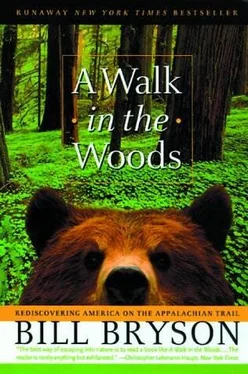Bill Bryson - A Walk In The Woods
Здесь есть возможность читать онлайн «Bill Bryson - A Walk In The Woods» весь текст электронной книги совершенно бесплатно (целиком полную версию без сокращений). В некоторых случаях можно слушать аудио, скачать через торрент в формате fb2 и присутствует краткое содержание. Жанр: Современная проза, на английском языке. Описание произведения, (предисловие) а так же отзывы посетителей доступны на портале библиотеки ЛибКат.
- Название:A Walk In The Woods
- Автор:
- Жанр:
- Год:неизвестен
- ISBN:нет данных
- Рейтинг книги:4 / 5. Голосов: 1
-
Избранное:Добавить в избранное
- Отзывы:
-
Ваша оценка:
- 80
- 1
- 2
- 3
- 4
- 5
A Walk In The Woods: краткое содержание, описание и аннотация
Предлагаем к чтению аннотацию, описание, краткое содержание или предисловие (зависит от того, что написал сам автор книги «A Walk In The Woods»). Если вы не нашли необходимую информацию о книге — напишите в комментариях, мы постараемся отыскать её.
A Walk In The Woods — читать онлайн бесплатно полную книгу (весь текст) целиком
Ниже представлен текст книги, разбитый по страницам. Система сохранения места последней прочитанной страницы, позволяет с удобством читать онлайн бесплатно книгу «A Walk In The Woods», без необходимости каждый раз заново искать на чём Вы остановились. Поставьте закладку, и сможете в любой момент перейти на страницу, на которой закончили чтение.
Интервал:
Закладка:
She went off to deal with a distant customer, and Katz watched her go with something like paternal pride. “She’s pretty ugly, isn’t she?” he said with a big, incongruous beam.
I sought for tact. “Well, only compared with other women.”
Katz nodded thoughtfully, then fixed me with a sudden fearful look. “You know what I look for in a female these days? A heartbeat and a full set of limbs.”
“I understand.”
“And that’s just my starting point, you realize. I’m prepared to compromise on the limbs. You think she’s available?”
“I believe you might have to take a number.”
He nodded soberly. “Probably be an idea if we ate up and got out of here.”
I was very happy with that. I drained a cup of coffee and we went off to get our things. But when we met up outside ten minutes later, togged up and ready to go, Katz was looking miserable. “Let’s stay here another night,” he said.
“What? Are you kidding?” I was completely taken aback by this. “Why?”
“Because it’s warm in there and it’s cold out here.”
“We’ve gotta do it.”
He looked to the woods. “We’ll freeze out there.”
I looked to the woods, too. “Yeah, probably. We’ve still gotta do it.”
I hoisted my pack and took a backward stagger under the weight (it would be days before I could do this with anything approaching aplomb), jerked tight the belt, and trudged off. At the edge of the woods, I glanced back to make sure Katz was following. Ahead of me spread a vast, stark world of winter-dead trees. I stepped portentously on to the path, a fragment of the original Appalachian Trail from the days when it passed here en route from Mount Oglethorpe to Springer.
The date was March 9, 1996. We were on our way.
The route led down into a wooded valley with a chuckling stream edged with brittle ice, which the path followed for perhaps half a mile before taking us steeply up into denser woods. This was, it quickly became evident, the base of the first big hill, Frosty Mountain, and it was immediately taxing. The sun was shining and the sky was a hearty blue, but everything at ground level was brown-brown trees, brown earth, frozen brown leaves-and the cold was unyielding. I trudged perhaps a hundred feet up the hill, then stopped, bug-eyed, breathing hard, heart kabooming alarmingly. Katz was already falling behind and panting even harder. I pressed on.
It was hell. First days on hiking trips always are. I was hopelessly out of shape-hopelessly. The pack weighed way too much. Way too much. I had never encountered anything so hard, for which I was so ill prepared. Every step was a struggle.
The hardest part was coming to terms with the constant dispiriting discovery that there is always more hill. The thing about being on a hill, as opposed to standing back from it, is that you can almost never see exactly what’s to come. Between the curtain of trees at every side, the ever-receding contour of rising slope before you, and your own plodding weariness, you gradually lose track of how far you have come. Each time you haul yourself up to what you think must surely be the crest, you find that there is in fact more hill beyond, sloped at an angle that kept it from view before, and that beyond that slope there is another, and beyond that another and another, and beyond each of those more still, until it seems impossible that any hill could run on this long. Eventually you reach a height where you can see the tops of the topmost trees, with nothing but clear sky beyond, and your faltering spirit stirs-nearly there now!-but this is a pitiless deception. The elusive summit continually retreats by whatever distance you press forward, so that each time the canopy parts enough to give a view you are dismayed to see that the topmost trees are as remote, as unattainable, as before. Still you stagger on. What else can you do?
When, after ages and ages, you finally reach the telltale world of truly high ground, where the chilled air smells of pine sap and the vegetation is gnarled and tough and wind bent, and push through to the mountain’s open pinnacle, you are, alas, past caring. You sprawl face down on a sloping pavement of gneiss, pressed to the rock by the weight of your pack, and lie there for some minutes, reflecting in a distant, out-of-body way that you have never before looked this closely at lichen, not in fact looked this closely at anything in the natural world since you were four years old and had your first magnifying glass. Finally, with a weary puff, you roll over, unhook yourself from your pack, struggle to your feet, and realize-again in a remote, light-headed, curiously not-there way-that the view is sensational: a boundless vista of wooded mountains, unmarked by human hand, marching off in every direction. This really could be heaven. It’s splendid, no question, but the thought you cannot escape is that you have to walk this view, and this is the barest fraction of what you will traverse before you’ve finished.
You compare your map with the immediate landscape and note that the path ahead descends into a steep valley-a gorge really, not unlike the gorges the coyote is forever plunging into in Roadrunner cartoons, gorges that have actual vanishing points-which will deliver you to the base of a hill even more steep and formidable than this, and that when you scale that preposterously taxing peak you will have done 1.7 miles since breakfast, while your schedule (blithely drawn up at a kitchen table and jotted down after perhaps three seconds’ consideration) calls for 8.9 miles by lunch, 16.8 by supper, and even greater distances tomorrow.
But perhaps it is also raining, a cold, slanting, merciless rain, with thunder and lightning playing on the neighboring hills. Perhaps a troop of Eagle Scouts comes by at a depressing trot. Perhaps you are cold and hungry and smell so bad that you can no longer smell yourself. Perhaps you want to lie down and be as the lichen: not dead exactly but just very still for a long, long time.
But of course I had all that ahead of me. Today I had nothing to do but traverse four middling mountains over seven miles of well-marked trail in clear, dry weather. It didn’t seem too much to ask. It was hell.
I don’t know exactly when I lost track of Katz, but it was in the first couple of hours. At first I would wait for him to catch up, bitching every step of the way and pausing after each three or four shuffling paces to wipe his brow and look sourly at his immediate future. It was painful to behold in every way. Eventually I waited to see him pull into view, just to confirm that he was still coming, that he wasn’t lying on the path palpitating or hadn’t thrown down his pack in disgust and gone looking for Wes Wisson. I would wait and wait, and eventually his shape would appear among the trees, breathing heavily, moving with incredible slowness, and talking in a loud, bitter voice to himself. Halfway up the third big hill, the 3,400-foot-high Black Mountain, I stood and waited a long while, and thought about going back, but eventually turned and struggled on. I had enough small agonies of my own.
Seven miles seems so little, but it’s not, believe me. With a pack, even for fit people it is not easy. You know what it’s like when you’re at a zoo or an amusement park with a small child who won’t walk another step? You hoist him lightly onto your shoulders and for a while-for a couple of minutes-it’s actually kind of fun to have him up there, pretending like you’re going to tip him off or cruising his head towards some low projection before veering off (all being well) at the last instant. But then it starts to get uncomfortable. You feel a twinge in your neck, a tightening between your shoulder blades, and the sensation seeps and spreads until it is decidedly uncomfortable, and you announce to little Jimmy that you’re going to have to put him down for a while.
Читать дальшеИнтервал:
Закладка:
Похожие книги на «A Walk In The Woods»
Представляем Вашему вниманию похожие книги на «A Walk In The Woods» списком для выбора. Мы отобрали схожую по названию и смыслу литературу в надежде предоставить читателям больше вариантов отыскать новые, интересные, ещё непрочитанные произведения.
Обсуждение, отзывы о книге «A Walk In The Woods» и просто собственные мнения читателей. Оставьте ваши комментарии, напишите, что Вы думаете о произведении, его смысле или главных героях. Укажите что конкретно понравилось, а что нет, и почему Вы так считаете.












